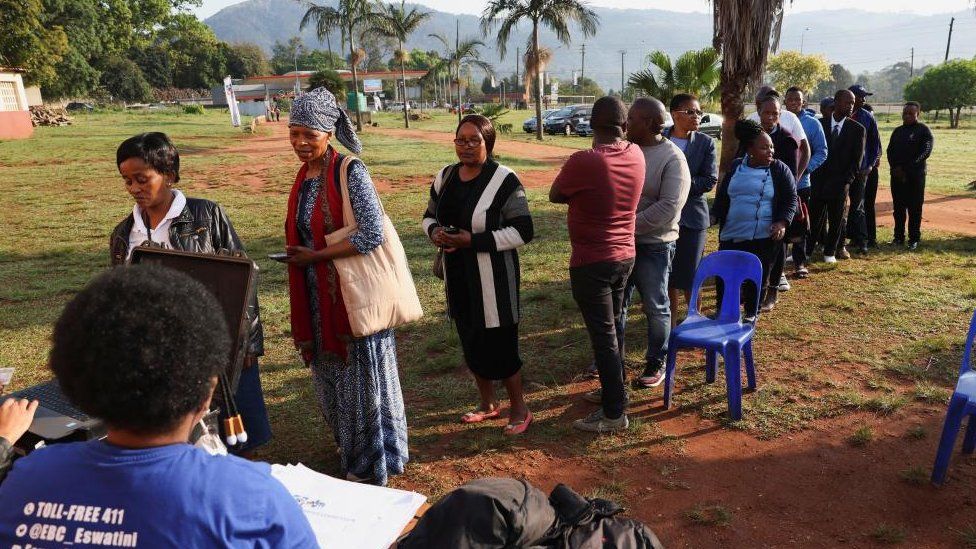People in Eswatini, Africa’s last absolute monarchy, are voting in parliamentary elections where candidates are not allowed to run for a political party.
This is the first poll there since 2021’s deadly pro-democracy protests.
Critics have dismissed the elections as a farce meant to legitimise the absolute monarchy.
But King Mswati III has encouraged people to turn out to vote to ensure peace and stability is maintained.
More than half a million people registered to vote and they will be electing 59 members of the lower house of parliament. But the MPs only have an advisory role and do not wield any tangible power in the country previously known as Swaziland.
The 55-year-old king, who inherited the throne in 1986 aged just 18, will select 10 more representatives.
Reports from the capital, Mbabane, said calm prevailed at the polling stations on Friday morning.
- Africa Live: Updates on this and other stories from the continent
- Find out more about Eswatini
Political parties have been banned in Eswatini since 1973, forcing individuals seeking elected positions to run as independent candidates in the parliamentary elections, which happen every five years.
The monarchy’s crackdown on dissent and the country’s political nomination system, which involves traditional chiefs choosing candidates, often produces elected officials supportive of the monarchy.
Ahead of the vote, some Swazis expressed scepticism that the elections would bring about change, as the parliament cannot criticise or take action against the executive or king.
The king also appoints the cabinet, prime minister and judges, approves laws proposed by parliament and commands all of Eswatini’s security forces.
“Even if they got elected into parliament, they do not have the power to hold the executive accountable, including the absolute monarchy,” Zweli Martin Dlamini, the editor of Swaziland News, told the BBC’s Newsday programme.

Like other outspoken critics of Mswati III, Mr Dlamini has been prosecuted several times for what he has written about the king.
Two opposition lawmakers, elected in 2018, are currently detained for pushing for democratic rule, while a third fled into exile.
In 2021, student-led protests that began over alleged police brutality morphed into calls for political change. At least 46 people died in a series of clashes between the security forces and demonstrators, according to Human Rights Watch.
The government has disputed this figure and said that the police were responding to violent attacks.
In January this year, Thulani Rudolf Maseko, a human rights lawyer who was opposed to the king, was killed in his home, hours after the monarch warned critics who go against him.
King Mswati appeared to dismiss criticism of his government as polling opened on Friday.
He said that the “outgoing government did an exceptional job” and urged voters to “vote for people who will ensure that the kingdom remains peaceful; who love Eswatini and the nation, and who will continue to advance the kingdom’s development aspirations”.
The king’s polygamous and opulent lifestyle, which is characterised by luxury cars and watches, has long faced criticism.
More than a third of the country’s 1.2 million people live below the international poverty line.
Election results are expected this weekend.
